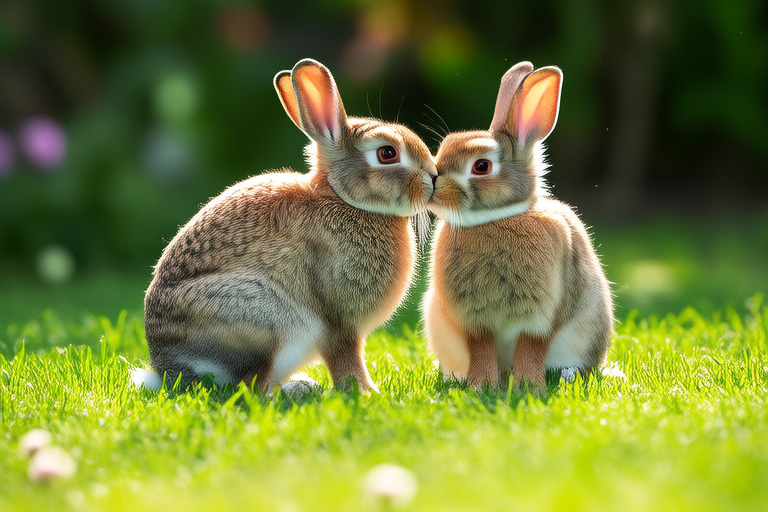From Hopping to Bonding: Everything You Need to Know About Dutch Dwarf Rabbits
Dutch Dwarf rabbits are one of the most charming and delightful small breeds of domestic rabbits. Known for their compact size and distinctive coloring, these little bunnies have captured the hearts of many pet lovers. Their unique appearance and gentle demeanor make them ideal companions for families and individuals alike. This article will guide you through everything you need to know about Dutch Dwarf rabbits, from their origins and characteristics to proper care and bonding techniques.
The Unique Appearance and Size of Dutch Dwarf Rabbits
Dutch Dwarfs are one of the smallest rabbit breeds, typically weighing between 1.6 and 2.3 kg (3.5 to 5 pounds). Despite their petite stature, they possess a robust and well-proportioned body. They come in a variety of colors, including black, blue, chocolate, and white, with a distinct color pattern that sets them apart. The typical marking includes a white blaze on the face and contrasting colored ears, feet, and tail. Their short, dense fur requires minimal grooming, making them a low-maintenance option for those who want a pet with a unique look without the hassle of extensive grooming.
Temperament and Ideal Pet Characteristics
One of the reasons Dutch Dwarf rabbits are such popular pets is their friendly and gentle nature. They are generally docile and enjoy human interaction, which makes them perfect for families with children. However, it’s important to handle them gently due to their small size. Dutch Dwarfs are curious and playful, often engaging in activities like digging and chewing. Providing them with toys and safe spaces to explore can help keep them entertained and mentally stimulated. Their social nature also means they can bond well with other rabbits, making them suitable for multi-rabbit households.
Proper Care for Dutch Dwarf Rabbits
Dietary Needs
A balanced diet is crucial for maintaining the health of your Dutch Dwarf rabbit. Their diet should primarily consist of hay, which aids in digestion and keeps their teeth healthy. Fresh vegetables, such as carrots, broccoli, and leafy greens, should be offered in moderation. Pellets formulated specifically for rabbits should also be part of their daily intake, but avoid overfeeding to prevent obesity. Always ensure your rabbit has access to fresh water at all times.
Housing Requirements
Dutch Dwarfs thrive in environments that provide ample space for movement and comfort. A spacious cage or hutch is essential, ideally measuring at least 48 inches long, 24 inches wide, and 24 inches high. The flooring should be solid to prevent injury to their delicate feet, and it should be easy to clean. Adding bedding made from hay or straw provides warmth and comfort. Additionally, include hideaways and tunnels to stimulate their natural burrowing instincts. Regular cleaning of the living area is necessary to maintain hygiene and prevent illness.
Exercise and Enrichment
While their small size might suggest limited exercise needs, Dutch Dwarfs still require regular physical activity to stay healthy. Daily supervised playtime outside their enclosure allows them to stretch their legs and explore their surroundings. Exercise balls and tunnels can offer additional stimulation and entertainment. It’s important to ensure the environment is rabbit-proofed to prevent any accidents or injuries during their playtime.
Bonding with Your Dutch Dwarf Rabbit
Bonding with your Dutch Dwarf rabbit involves patience and consistency. Begin by spending time near your rabbit’s enclosure, allowing them to become accustomed to your presence. Gradually introduce gentle handling, starting with petting them while they’re in their cage. Once they’re comfortable with this, you can begin to hold them, supporting their body and head properly. Positive reinforcement through treats and praise can strengthen the bond. Remember, each rabbit has its own personality, so adapt your approach accordingly.
Common Health Issues to Watch Out For
Like any pet, Dutch Dwarf rabbits are susceptible to certain health issues. Dental problems are common due to their continuously growing teeth. Ensuring they have plenty of hay and chew toys can help manage this. Gastrointestinal stasis, a condition where the digestive system slows down or stops, can be life-threatening if not treated promptly. Signs include lethargy, loss of appetite, and changes in droppings. Regular veterinary check-ups and a balanced diet can help prevent these issues. Other common ailments include respiratory infections and ear mites, both of which require prompt medical attention.
Adopting from Shelters or Reputable Breeders
When considering adding a Dutch Dwarf rabbit to your family, adoption from shelters or reputable breeders is highly recommended. Shelters often have rabbits that are already house-trained and may have had previous experience with humans, making the bonding process smoother. If you choose to go through a breeder, ensure they are reputable and adhere to ethical breeding practices. This includes providing documentation of vaccinations and health clearances. Regardless of where you adopt, always research thoroughly and prepare your home before bringing your new furry friend home.
In conclusion, Dutch Dwarf rabbits are delightful companions that bring joy and companionship to their owners. By understanding their unique needs and providing proper care, you can ensure a happy and healthy life for your pet. Whether you’re a first-time pet owner or an experienced bunny lover, Dutch Dwarfs offer a rewarding and loving addition to any household. Happy hopping!
